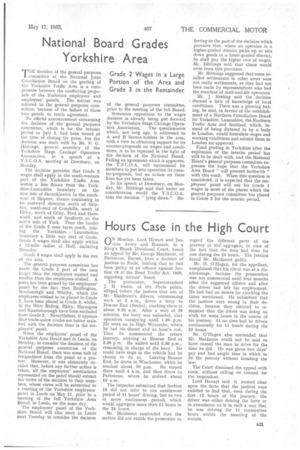Hours Case in the High Court
Page 31

If you've noticed an error in this article please click here to report it so we can fix it.
rIN Monday, Lard Hewart and Jus
tices Avory and Branson, in a King's Bench Divisional Court, heard an appeal by Mr. George Maidment, of Parkstoue, Dorset, from a decision of justices at Poole, holding that he had been guilty of an offence against Section 19 of the Road Traffic Act, 1930, regarding drivers' hours.
The prosecutor, Superintendent J. H. Swain, of the Poole police, alleged before the justices that one of Mr. Maidment's drivers, commencing work at 2 a.m., drove a lorry to Bourne End (Bucks), reaching there at about 9.30 a.m. After a wait of 20 minutes, the lorry was unloaded, that operation occupying until 1.30 p.m. He went on to High Wycombe, where he had his dinner and an hour's rest. Then he commenced the return journey, arriving at Bourne End at 3.30 p.m. He waited until 5.30 p.m., remaining in charge of the lorry. He could have slept in the vehicle had he chosen to do so. Leaving Bourne End, he drove to Winchester, which he reached about 10 p.m. He stayed there until 4 a.m. and then drove to Parkstone, where he arrived about 10 a.m.
The inspector submitted that Section 19 did not refer to one continuous period of 11 hours' driving, but to two or more continuous periods which would aggregate more than 11 hours in the 24 hours.
Mr. Maidment contended that the section did not entitle the prosecutor to regard the different parts of the journey in the aggregate, in view of the fact that the man had time for rest during the 24 hours. The justices found Mr. Maidment guilty.
Mr. H. O'Hagan, for the appellant, complained, that his client was at a disadvantage, because the prosecution was not commenced until four months after the suggested offence and after the driver had left his employment. He had had no means for checking the times mentioned. He submitted that the justices were wrong in their decision, because they omitted to remember that the driver was doing no work for some hours in the course of his journey. At no time had he driven continuously for 11 hours during the 24 hours.
Mr. O'Hagan also contended that Mr. Maidment could not be said to have caused the man to drive for the time he did. He was given two days' pay and had ample time in which to do the journey without breaking the law.
The Court dismissed the appeal with costs, without calling on counsel for the respondent.
Lord Hewart said it seemed clear upon the facts that the justices were entitled to find that, even during the first 12 hours of the journey, the driver was either driving the lorry or in attendance on it in such a way, that he was driving for 11 consecutive hours within the meaning of the statute.






















































































